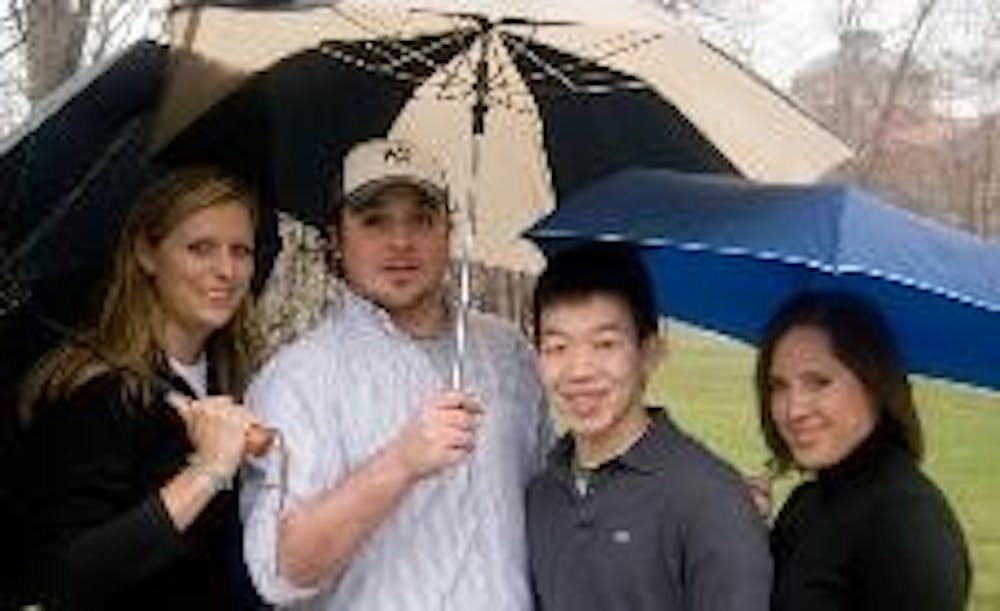
Left to right
John Mayer sang that this generation is waiting for the world to change. Four Miami University seniors beg to differ, and they're aiming to change the world-at least part of it-themselves.
The students, all international studies majors, received $50,000 fellowships for winning first place in an international competition hosted by the Massachusetts Institute of Technology for their senior capstone project, "Look Up: Rainwater Harvesting." The competition involved envisioning steps toward the restoration of Jerusalem to a peaceful and sustainable region by the year 2050.
Seniors Michael Lin, Ann Davis, Amanda Zazycki and David Orwig, researched alternative methods of providing the city of Jerusalem with an effective means of lessening its overwhelming dependency on extracting water from the Jordan River Basin. They concluded that the most effective way to mitigate the pressing issue is to test the idea of harvesting rainwater.
According to Lin, 62 percent of Jerusalem's usage of the Jordan River's two aquifers is currently used to irrigate the city's crops, which only accounts for 2.5 percent of its gross domestic product (GDP).
Davis added that when these aquifers contain low amounts of water, they become contaminated with groundwater. With assistance from the United Nations Environment Programme (UNEP) through funding, education and training, restoring the aquifers with rainwater may be the most viable solution to preventing the struggling city from experiencing what many sources predict to be a permanent drought in 20-30 years.
"With UNEP's knowledge and experience with this task, we felt that their expertise would steer us in the right direction," Lin said. "They're mediators with a solution."
UNEP works with environmental issues in struggling states through the authority of the United Nations, and may be a key factor in settling the water shortage issue in Jerusalem, which the team believes will help relieve economic tensions between Palestinians and Israelis.
While researching more than 100 sources from scholarly articles and books, the capstone team made the decision to push for a new, long-term answer that was alternative to the many expensive and short-term ideas that have been considered before.
The capstone was integrated into associate professor Mark Allen Peterson's fall 2007 international studies capstone seminar, Problems in the Middle East, and submitted to MIT in December 2007.
The four group members were able to choose a topic that highlighted one of Jerusalem's main physical problems and found the region's struggle for water to be the most pressing issue.
Enjoy what you're reading?
Signup for our newsletter
According to Peterson, the team of four completed the project in merely one semester, while many other entrants were allotted one year. The 1,286 entries, representing 89 countries, followed four different categories reflecting the economic, physical, civic and symbolic issues that Jerusalemites face today. Peterson's team won the economic division.
"All the groups did an excellent job," Peterson said. "I think the most significant thing about this group was their perseverance and academic honesty."
The team did not believe their project would make it as far as first place in the MIT competition.
"It was a long shot," Davis said. "We knew we were going up against professionals."
Despite the competition, three of the team's four proposals were recognized by the Jerusalem 2050 Project at MIT.
Zazycki was working when she heard the news that her capstone group won.
"I couldn't even think," she said. "It was the most surreal thing ever."
Davis shared the same reaction.
"I didn't even believe it until I saw it on the Internet," she said.
The four have been invited to attend a conference in Jerusalem this December and will use their $50,000 fellowship award to conduct advanced research at MIT as Jerusalem Visionary Fellows.
They will participate in university seminars and workshops this fall to implement their design ideas with Meron Benvenisti, a former deputy mayor of Jerusalem.




